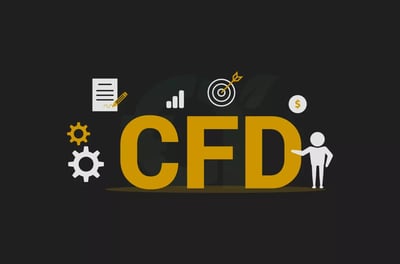Table Of Contents
- What are CFDs?
- Do You Need a Broker to Trade CFDs?
- Is CFD Trading Allowed Everywhere?
- What Are the Risks of CFD trading?
- The Pros and Cons of CFD Trading
- What are the Best Trading Strategies for Trading CFDs?
- Capital Required to Trade CFDs
- The Ideal Length of Time to Stay in a CFD Contract
- CFD Trading and Copy Trading
- What Features Should a Good CFD Broker Offer?
- The Bottom Line
What Are CFDs and How to Invest in Them
As a longtime trader, I can confirm that Contracts for Difference (CFD) are a type of financial instrument that allows you to speculate on the performance of a financial asset without actually owning it.
It's a trading method that most brokers support, and you can use it to trade FOREX, stocks, indices, commodities, and cryptocurrencies. CFDs are a suitable trading method to trade with leverage, as you can gain exposure to a larger position than your initial investment. Another reason they can be attractive is that CFDs typically offer lower fees and commissions than other forms of trading, such as futures or options. This can help you keep your costs in check.
They are flexible instruments that allow you to open and close positions at any time and use them with various trading strategies, such as scalping, day trading, or swing trading. If you are looking for a flexible, accessible, and cost-effective way to trade multiple markets and asset classes, CFDs may be for you. By now, you must be wondering exactly what CFDs are and how you can get in on the action. In the remainder of the article, I will describe what CFDs are and how you can trade them.
CFDs allow you to speculate on price movements without owning the underlying asset, covering instruments like stocks, FOREX, indices, commodities, and crypto
You can use leverage to open larger positions than your capital would normally allow, amplifying both profits and losses
CFD brokers act as counterparties, setting margin requirements and borrowing terms, so choosing a regulated firm with clear fees and good support is critical
Many regions impose leverage caps, for example in Europe, FOREX limited to 30:1, commodities to 20:1, and equities to 5:1, while others ban CFDs entirely
Risks include complexity, rapid price swings, potential losses beyond initial investment due to leverage, and counterparty risk if your broker fails
Benefits include lower fees compared with futures or options, flexible entry and exit on various timeframes, and the ability to short sell
Effective CFD trading relies on strategies like scalping, day trading, swing trading, and careful capital planning based on contract duration and investment size
Choose brokers that offer negative balance protection, margin call rules, robust trading platforms, transparent fee structures, and strong regulation before trading CFDs.
What are CFDs?
CFDs are financial instruments that allow traders to speculate on the price movements of various financial markets without owning the underlying assets. They are common in the FOREX world, but can be applied just as easily to a range of markets, such as stocks, indices, commodities, and cryptocurrencies.
In my view, if you, as a trader, enter a CFD contract because you believe you can predict if an asset will appreciate or depreciate at some point in the future. A CFD is really a wager you make with your broker that your prediction will be the right one.
CFDs work when traders enter a contract with a broker to exchange the difference in price of an underlying asset at the end of the contract period. If the price goes up as the trader predicted, the trader makes a profit; while if the price goes down, the broker wins and the trader loses. CFDs are attractive because you can short an asset, meaning you can predict it will lose value, so you can place a wager in both directions.

Do You Need a Broker to Trade CFDs?
You cannot trade CFDs without the help of a broker. This is because brokers provide the trading platform and act as intermediaries to help you access the financial markets. The broker acts as the counterparty to the CFD trade and sets the terms of the contract. The broker is in charge of placing a margin requirement and how much leverage you can utilize on the trade. Remember that when trading CFDs, you must always select a reputable and regulated broker that offers a user-friendly CFD trading platform. As always, you should be looking for competitive fees and commissions, not to mention dependable customer support.
Is CFD Trading Allowed Everywhere?
CFD trading is perfectly legal in many markets around the world. However, not all countries treat it the same, with some implementing more strict rules than others. Certain countries restrict how much leverage brokers can offer for CFD trading. Other countries, such as the US, have outright bans on CFD trading.
Some European countries have firm restrictions on CFD trading. CFD trading in Europe is regulated by the European Securities and Markets Authority (ESMA), which has imposed restrictions on the marketing and sale of CFDs to retail investors in the EU since August 2018. European traders will find that they must abide by such CFD trading guidelines as:
Leverage limits: Traders do not have access to leverage on FOREX pairs higher than 1:30. For minor pairs, gold and most indices, traders can only receive leverage of 1:20. Minor indices, commodities and crypto leverage are capped at 1:10, while equities are capped at 1:5.
Negative balance protection: brokers that provide CFD trading must ensure that clients cannot lose more than their account balance.
Margin close-out: According to this rule, brokers must freeze a client's position when their funds drop below a certain percentage of the margin required to maintain their open positions.
Marketing and distribution: European brokers must be alert to hold back from encouraging trading via bonuses and promotions, and they are obliged to post clear warnings about the dangers of CFDs, such as their high leverage, volatility and the potential for trader losses exceeding the initial investment.
What Are the Risks of CFD trading?
CFD trading, like all financial market speculation, involves major risks, including:
Complexity: CFD trading is not a simple form of trading. It typically involves many considerations, such as how to apply viable trading strategies to volatile and fast-moving markets. Traders can easily lose money, that's why you are always advised to master technical analysis tools to inform your trading decisions.
Market volatility: CFD prices often shift rapidly in response to breaking news or market developments. If traders do not watch their positions closely, they can suffer significant losses. Alternatively, they could also benefit from serious gains.
High leverage: Most investors trade on margin when entering CFD contracts, as they want to take on larger positions than their capital allows. The danger of this is that losses can exceed the initial investment if a trader makes a bad move.
Counterparty risk: Brokers act as counterparties in CFD contracts, and traders are naturally exposed to their broker's credit risk. Many brokers have become insolvent while their customers have open trades. In these instances, the trader stands to lose all their money if there is no compensation scheme in place.
Regulatory risk: CFDs are highly regulated in some countries, as I've noted. There is a risk to getting things wrong and being punished by a regulator.
CFD trading is known as a high-risk, high-reward trading activity that must be approached with careful risk-management strategies and mastery of the markets. Traders must not invest more than they can afford to lose and they should at all times know the risks involved before engaging in this type of trading.
The Pros and Cons of CFD Trading
Pros:
Short-selling: As a CFD trader, you can make money not only when assets gain value, but also when they lose value, giving you twice the opportunity to earn. If you were interested in stocks, and you knew that a company stock price was about to drop because of adverse company news, you could easily short-sell that stock as a CFD.
Leverage: You can earn higher returns with leverage. Even if you have very little capital, trading on leverage gives you access to much larger positions than you would have without leverage, which means that you can potentially earn higher returns.
Diversification: This is one of the mantras of the trading world – diversify! Every expert will tell you it is better to have a wide range of financial assets and trading strategies in your portfolio so you can protect yourself from losing money when one type of trading fails you. With CFDs, you can trade on a wide range of financial markets, including FOREX, stocks, indices, commodities and cryptocurrencies.
Cons:
High risks: CFD trading comes with no small amount of risk. You are constantly on a high wire, balancing the risks posed by high leverage, volatility and potential losses exceeding the initial investment.
Counterparty risk: Traders are exposed to the credit risk of their broker. If you do not choose your broker well, you could find yourself in a situation where you assume the counterparty risk if your broker goes insolvent.
Complexity: CFD trading is not ideal for newbies. You should ideally be conversant with the markets before you start with CFDs. Are you conversant with Fibonacci indicators or Bollinger bands to inform your trading positions? Depending on where they operate, many brokers must voluntarily disclose on their platforms that CFD trading is especially risky and that traders could lose money easily.
Recommended Brokers
What are the Best Trading Strategies for Trading CFDs?
In my experience, every trader’s CFD strategy depends on their individual goals, risk tolerance, and trading preferences. That said, here are the most popular trading styles that are commonly used in CFD trading:
Scalping: With scalping, you hold positions open for a brief time, as little as a few seconds to a few minutes. The intention is to profit from fractionally small price movements.
Trend-following: With this strategy, traders identify trends in the market and try to understand the direction of the trend. Using technical indicators, like moving averages, trendlines or relative strength index (RSI), you can make money from trends.
Breakout: Skilled traders can come to understand when asset prices break through key support (lower) or resistance (upper) levels. Using common technical indicators, such as Bollinger Bands, traders can identify breakouts to help them set trades.
Swing trading: If you prefer a gentler trading pace, swing trading could be for you. With this type of trading, you would hold an asset for a few days to several weeks, depending on the strength of the trend.
News trading: The world is awash with news alerts and breaking market information. Some sensitive financial assets, such as cryptocurrencies, typically respond to good or bad market news. If you learn how to craft a winning strategy around economic releases, company earnings, or geopolitical events, you could do well with this type of trading.
I would always say that it is vital to select a strategy that suits your trading style, risk tolerance, and market conditions. You must have a clear understanding of entry and exit points, risk management, and position sizing, before you start to trade.
Capital Required to Trade CFDs
To begin, you will need at least some capital to get going. To open your first CFD position, you must deposit money into your trading account, which will serve as collateral for any losses that you may incur. Typically, the amount of funds you need to trade CFDs depends on several factors, such as the minimum position size and leverage offered by your broker, as well as the margin requirements.
Remember that CFD trading involves significant risks, including the risk of losing more than your initial deposit, and traders should be aware of the risks involved and manage their positions carefully.Financial assets can be volatile for a number of reasons, including market conditions, economic events, and geopolitical developments. Some CFD assets are generally considered more volatile than others. Here are some examples:
Cryptocurrencies: Even the two largest coins on the market, Bitcoin and Ethereum, are highly volatile due to the crypto industry’s small market size, lack of regulation, and forces of speculative demand.
Minor and exotic currency pairs: The currencies of emerging market countries, such as the Turkish lira, Argentine peso or South African rand, are much more volatile than major currencies due to their economic fragility and high exposure to political and economic risks.
Commodities: Oil, gold or silver can sometimes be safe-haven assets when other markets are experiencing turmoil, but often these same commodities can undergo significant price fluctuations due to global economic trends and geopolitical events.
Individual stocks: Stocks of individual companies can move up and down sharply due to company-specific events, like earnings reports, product failures and regulatory challenges.
Yes, high volatility can offer both opportunities and risks for CFD traders. You must carefully read the risks to understand the potential rewards before entering any trade.
The Ideal Length of Time to Stay in a CFD Contract
In my opinion, there is no ideal length for a CFD contract. How you profit can vary markedly depending on market conditions, the underlying asset, and the trading strategy you use. As we have said, some CFD traders hold positions open for just a few minutes or hours, while others might hold positions for several days or even weeks.
It all depends on the trading strategies you use. This is a bigger determining factor on how long you keep contracts open than anything else. Trading styles like day trading or scalping often have much shorter holding periods, as little as a few minutes to a few hours. At the opposite end of the scale, longer-term trading strategies, like swing trading or trend following, can have open periods ranging from several days to several weeks or even months.
CFD Trading and Copy Trading
I would say that copy trading can be a very useful tool for newbie traders who want to study the approaches of elite traders and potentially generate profits from replicating their trades. Copy trading is when traders mimic the trades of more experienced traders with a view to making money from the latter’s knowledge and expertise.
Yes, it is possible to be a successful CFD trader through copy trading, but you must keep in mind that it is not a fail-proof strategy. Success in copy trading relies on the performance of the trader you are copying, so naturally, if the trading signals they issue are not successful, you could also lose money. Do you want to delegate all your risks to another trader? Some traders, even if they are successful over time, often use high-risk strategies that can generate large profits, but also carry a higher chance of loss.
When choosing a trader to mimic CFD trading, you choose the right trader to copy. This is why Arincen has a thriving social community where traders like you can learn from the strategies of other successful traders in a friendly learning environment. Look for traders with a track record of consistent profits, a low drawdown rate, and a trading style that aligns with your risk tolerance and goals.
Also, remember to diversify your copy-trading portfolio by copying several traders across different asset classes. Copy trading is, indeed, a powerful tool for beginner CFD traders to learn from elite traders and potentially earn good profits. However, it is important to do your research and carefully select the traders you copy.
What Features Should a Good CFD Broker Offer?
As a longtime trader, I can vouch that choosing a broker for CFD trading can be a challenging task, as there are many factors to consider, including regulatory compliance, trading platform features, spreads and commissions, asset selection, customer service, and even more.
The best CFD broker for you will depend on your individual needs and preferences, so it is important to do your research and compare different brokers before making a decision. Retail trading brokers are constantly striving to create the best combination of tools and features that cater to the needs of every trader, especially in the field of CFD trading. The trading platform is a very important part of a broker’s service offering – some would say it is the most important part. This is because it is the interface that traders spend hours of each day poring over. If there are any design or performance flaws, these quickly become evident for a CFD trader.
You will notice that the best brokers strive to create a full-service offering that includes access to several different account types for traders of every level, rapid execution speeds, and detailed market insights and analysis. Traders also want access to the most competitive liquidity providers and charts that are easy to read and from which to trade. Finally, customer service is increasingly important as new traders enter the marketplace and seek answers and assistance. Here are some other key functions a good CFD broker should offer:
Regulation: A good CFD broker should be regulated by a reputable financial authority to ensure they operate in a fair and transparent manner.
Asset selection: A good CFD broker should offer a wide range of asset classes on which trade, including FOREX, stocks, indices, commodities and cryptocurrencies, with a variety of instruments and contracts available for each.
Low fees and commissions: A good CFD broker should offer competitive pricing and low fees and commissions to help traders keep their costs down and maximize their profits.
Education and analysis: A good CFD broker should provide detailed educational resources and market analysis to help traders improve their trading skills and make data-driven trading decisions.
Customer support: As timing is key to trading, you must pick a brokerage firm that is able to provide good customer support around the clock. This most notably includes the company representatives being easy to reach, fast and polite, which will, in turn, spare you from having to worry about problems in the future.
Risk management tools: A good CFD broker should provide risk-management tools. such as stop-loss and take-profit orders, as well as margin requirements and other measures to help traders manage their risk and protect their capital.
The Bottom Line
Based on my experience, I am of the firm opinion that CFD trading can be a highly lucrative trading style. There has never been a better time to be a CFD trader, as brokers all over the world support this trading style. Yes, there are certain geographical limitations, and some regulators have placed major guardrails around CFD trading, but if it is an option in your trading jurisdiction, it can be a powerful way to trade and make money.
Don’t forget that, for all their pros, CFD trading does offer some significant cons, such as the ability to lose a lot of money very quickly, as it is a highly risky exercise. However, if you do your research ahead of time and enter the market with strong risk-management strategies, you have a chance of being successful.
FAQ
CFDs are financial instruments that allow traders to speculate on the up and down price movements of various financial markets without owning the underlying assets.
CFDs allow traders to enter into a contract with a broker to exchange the difference in price of an underlying asset between the opening and closing of the contract. If the price goes up as the trader has predicted, the trader makes a profit; and if the price goes down, the trader incurs a loss.
Most trading platforms allow CFD trading. This includes third-party platforms, such as the MetaTrader suite and even smaller rivals like cTrader. Additionally, the proprietary platforms of popular brokers like IG and Saxo Bank offer CFD trading with the IG Trading Platform and SaxoTraderGO, respectively.
CFDs can be traded on a wide range of financial markets, including FOREX, stocks, indices, commodities and cryptocurrencies.
The benefits of trading CFDs include the option to trade on margin, access to a wide range of financial markets, and the potential for much higher returns due to leverage. You can also use copy trading to be a successful CFD trader.
The risks of trading CFDs include the potential for significant losses due to leverage, market volatility, and the possibility of losing more than your initial investment. Losses can be sudden and very damaging.
Leverage allows traders to control a larger position with a modest amount of capital. For example, a leverage of 1:30 means that for every $1 invested, the trader can buy $30 worth of the underlying asset.
Margin is the minimum amount of capital a trader must deposit in their account to open a CFD position. The amount of margin required varies depending on the rules of the broker, the underlying asset, and the level of leverage.
When choosing a CFD broker, it is important to consider factors, such as regulation, fees and commissions, trading platforms, customer support and the range of markets available. Of course, your broker must allow CFD trading and you must operate in a jurisdiction where CFD trading is permitted by regulators.
In general, earnings from CFD trading are taxable, as this is simply a type of trading used to generate profits in markets such as FOREX, stocks, commodities and indices, the profits of which are all taxable in most jurisdictions.






